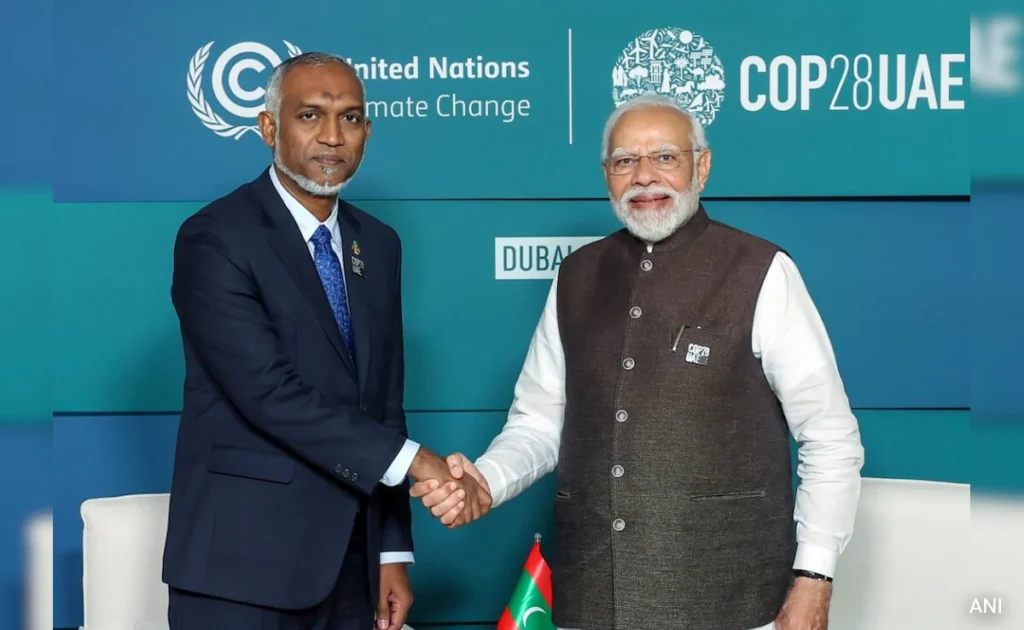The Maldives’ President Mohamed Muizzu recently acknowledged India’s vital role in helping the island nation navigate its economic challenges, specifically in easing debt repayment. In a significant gesture during the official Independence Day function, President Muizzu emphasized the importance of bolstering diplomatic and economic ties with India, expressing optimism about forging a stronger partnership, potentially through a Free Trade Agreement (FTA). This article explores the recent developments in Maldives-India relations, the role of foreign aid in economic recovery, and the prospects for future collaboration.
Table of Contents
Acknowledging India’s Support in Debt Relief
President Muizzu expressed gratitude towards both India and China for their assistance in managing the Maldives’ debt repayment issues. This support has been crucial in helping the Maldives maintain its economic sovereignty amidst financial difficulties. The President’s acknowledgment of this aid underscores the significance of international partnerships in stabilizing small economies like that of the Maldives.
The Maldives, like many other nations, faces challenges related to foreign debt. The assistance from India and China is particularly noteworthy, given the country’s economic struggles and the high risk of debt distress highlighted by the International Monetary Fund (IMF) earlier this year. The IMF’s warning indicated the urgency of adopting significant policy changes to avert economic crises, and the support from these major economies has been a critical lifeline.
Pursuing Economic Sovereignty: Currency Swap Agreements
To address the local shortages of US dollars, the Maldives government is actively negotiating currency swap agreements with India and China. These agreements aim to stabilize the Maldivian economy by providing much-needed foreign currency reserves, which are essential for trade and economic stability. The negotiations highlight the government’s proactive approach to securing economic stability and ensuring the availability of foreign currency for essential imports.
Currency swap agreements can provide a buffer against economic shocks and fluctuations in the global market, thereby offering a more stable economic environment. This initiative reflects the government’s commitment to mitigating the impact of external economic pressures on the Maldives’ economy.
Exploring Free Trade Agreements: A Strategic Economic Move
In addition to currency swaps, the Maldives is exploring the possibility of establishing FTAs with key partners. President Muizzu announced that his administration is in discussions with the United Kingdom for an FTA and hopes to achieve a similar agreement with India. Such agreements could significantly enhance trade opportunities for the Maldives, facilitating the flow of goods and services and boosting the nation’s economy.
An FTA with India, in particular, could be transformative, given India’s proximity and the existing trade relations between the two countries. A formal trade agreement would streamline trade processes, reduce tariffs, and potentially open new markets for Maldivian products. This move aligns with the Maldives’ broader strategy of diversifying its economic partnerships and reducing dependency on a single market.
Navigating Diplomatic Challenges: A New Phase in Maldives-India Relations
The Muizzu administration has adopted a reconciliatory tone towards India after a period of strained relations. This shift is evident in the diplomatic overtures made by both nations, including President Muizzu’s attendance at Prime Minister Narendra Modi’s oath ceremony, signifying a desire to mend ties. The Maldives’ approach towards India has been marked by ups and downs, particularly with the ‘India Out’ campaign that characterized Muizzu’s electoral strategy.
Despite the campaign rhetoric, the Maldives remains committed to maintaining strong ties with India. The recent diplomatic efforts indicate a recognition of India’s strategic importance and a willingness to engage in constructive dialogue. The complex interplay of domestic politics and foreign policy has influenced the Maldives’ stance, but the current administration seems focused on forging a balanced and mutually beneficial relationship with India.
Addressing Past Tensions: Moving Beyond the Diplomatic Row
The Maldives’ relationship with India has been tested by several incidents, including derogatory remarks made by Maldivian officials about Prime Minister Modi and disagreements over military presence in the Maldives. However, both nations have taken steps to resolve these issues, with the Maldives suspending the officials involved and India accommodating the Maldives’ request for troop withdrawal.
The resolution of these issues marks a new chapter in Maldives-India relations, characterized by mutual respect and cooperation. The suspension of the officials responsible for the derogatory remarks and the diplomatic efforts to address the concerns demonstrate both nations’ commitment to maintaining a cordial and productive relationship.
The Future of Maldives-India Relations: Opportunities and Challenges
Looking ahead, the Maldives and India have numerous opportunities to strengthen their partnership. The potential FTA, increased economic cooperation, and collaborative efforts in areas such as tourism and defense can significantly enhance bilateral ties. However, challenges remain, including the need to navigate domestic political pressures and manage the geopolitical dynamics involving other major powers like China.
The Maldives’ strategic location in the Indian Ocean makes it a critical player in regional geopolitics. As such, balancing relations with major powers, including India and China, will be a delicate task for the Muizzu administration. The Maldives’ diplomatic strategy will need to be nuanced, ensuring that it can leverage its relationships for economic and security benefits while maintaining its sovereignty and independence.
Conclusion
President Mohamed Muizzu’s administration is steering the Maldives towards a path of economic recovery and strengthened international relations, particularly with India. By acknowledging India’s support and exploring new avenues for cooperation, the Maldives is positioning itself as a proactive player on the global stage. The success of these initiatives will depend on the country’s ability to manage its domestic challenges and navigate the complexities of international diplomacy. As the Maldives continues to engage with key partners like India, the prospects for a stable and prosperous future look promising.
